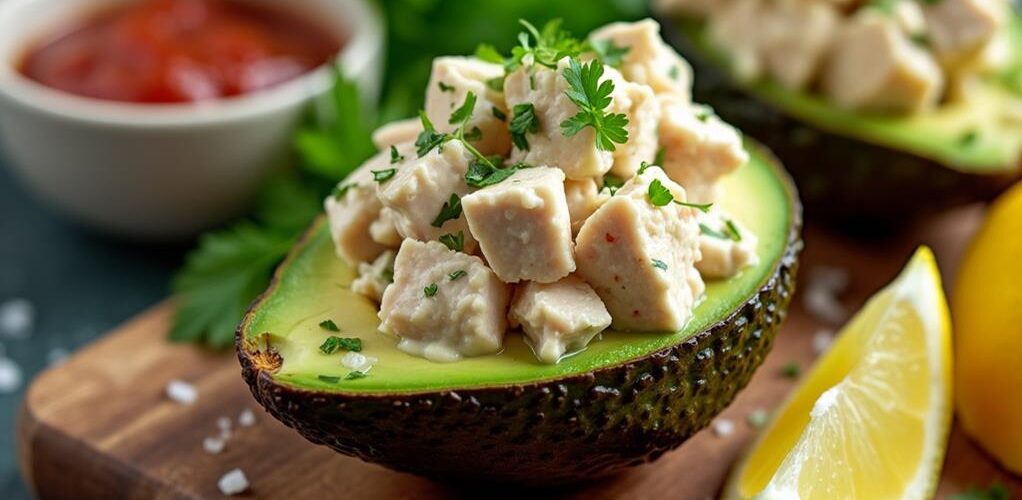
For a successful ketogenic diet, focus on these five must-have foods: fish and seafood, such as salmon and shrimp, rich in omega-3 fatty acids; high-quality meats and poultry like turkey and grass-fed beef; non-starchy vegetables including cauliflower and leafy greens for low-carb nutrients; healthy fats from avocados, extra virgin olive oil, and coconut oil; and low-carb fruits like blackberries and strawberries. These foods provide essential nutrients while maintaining ketosis, ensuring balanced and nutritious intake. Discover how these choices can enhance your keto journey by exploring more about their benefits and preparation methods.
Key Takeaways
- Salmon: High in protein and omega-3 fatty acids, supporting heart health and inflammation reduction.
- Avocados: Rich in monounsaturated fats, essential for achieving the required fat intake on a keto diet.
- Non-starchy vegetables: Low in carbs and calories, providing essential vitamins and minerals while maintaining ketosis.
- Extra virgin olive oil: Nearly 100% fat, ideal for cooking and salad dressings, promoting reduced inflammation and heart health.
- Berries: Low in sugar and carbs, excellent for keto diets, especially blackberries, strawberries, and raspberries.
Fish and Seafood
When commencing on a ketogenic diet, fish and seafood stand out as indispensable components due to their impressive nutritional profile. For instance, salmon offers approximately 26g of protein and 11.8g of fat per 100g, with negligible carbohydrates, making it an ideal keto-friendly choice.
Fatty fish such as salmon, mackerel, and sardines are particularly beneficial due to their rich content of omega-3 fatty acids, which are linked to improved heart health and reduced inflammation. Additionally, the American Heart Association recommends consuming 8-10 ounces of fish and seafood weekly to reap these health benefits and support ketosis.
To maximize the seafood benefits, it's advisable to consume 8-10 ounces of fish and seafood weekly. This intake not only supports ketosis but also enhances brain function and lowers the risk of chronic diseases.
Shellfish like shrimp and crab are also excellent choices, as they provide essential nutrients such as selenium and B vitamins while maintaining minimal carbohydrate content.
In terms of cooking techniques, grilling, baking, and steaming fish and seafood are recommended to preserve their nutritional integrity without adding unnecessary carbs. Incorporating these methods guarantees that the healthy fats and proteins are retained, thereby supporting the ketogenic diet effectively.
Meat and Poultry
Meat and poultry are fundamental staples of a ketogenic diet, providing high-quality protein without any carbohydrates, thereby fitting seamlessly into keto macros. These foods are not only rich in protein but also offer essential nutrients such as B vitamins and iron.
For instance, a 100g serving of turkey provides approximately 27g of protein and 12g of fat, while ground beef can offer around 26g of protein and 20g of fat per 100g. Opting for grass-fed beef can further enhance the omega-3 fatty acid content, which is beneficial for overall health. To maximize nutrient intake, it is advisable to include a variety of meats such as chicken, pork, and lamb in your diet.
When it comes to cooking methods, grilling, baking, and sautéing can help retain the nutritional value while minimizing the addition of unnecessary carbs. However, be cautious with processed meats like sausages, as they can contain fillers that increase carbohydrate content.
Monitoring labels and choosing high-quality, minimally processed options is essential. For those considering meat alternatives, options like tempeh and tofu can be incorporated, although they may require careful planning to fit within keto guidelines.
Non-Starchy Vegetables
In addition to meat and poultry, non-starchy vegetables also play a significant role in a well-rounded ketogenic diet. These vegetables, such as broccoli, cauliflower, and zucchini, are low in calories and carbohydrates, making them ideal for maintaining ketosis. For instance, cauliflower contains only 4g of net carbs per cup. The nutrient benefits of these vegetables are substantial, as they are rich in essential vitamins and minerals like vitamin C, potassium, and fiber, which support overall health and digestion.
Dark leafy greens, including spinach and kale, are particularly nutrient-dense. They provide high levels of vitamin K and antioxidants while being extremely low in carbohydrates. Non-starchy vegetables are versatile in cooking techniques, serving as substitutes for higher-carb foods; cauliflower, for example, can be transformed into rice or mashed alternatives. To maintain ketosis while still reaping the nutrient benefits, it is recommended to keep non-starchy vegetable intake to under 8 grams of net carbs per cup. This balance provides bulk and nutrients to meals without compromising the ketogenic state.
| Vegetable | Net Carbs per Cup (g) | Key Nutrients |
|---|---|---|
| Broccoli | 4.1 | Vitamin C, Fiber |
| Cauliflower | 4.0 | Vitamin C, Potassium |
| Zucchini | 2.0 | Vitamin A, Magnesium |
| Spinach | 1.0 | Vitamin K, Antioxidants |
| Kale | 3.4 | Vitamin K, Calcium |
Healthy Fats
Healthy fats stand as a cornerstone of the ketogenic diet, accounting for 70-80% of daily caloric intake and essential for achieving and maintaining ketosis. One notable source is avocados, which provide approximately 30 grams of fat per whole avocado, primarily in the form of monounsaturated fats. The avocado benefits include not only its high fat content but also its support for heart health due to its rich nutrient profile. Additionally, a diet rich in monounsaturated fats is associated with lower mortality rates.
Olive oil, particularly extra virgin olive oil, is another pivotal fat source for keto adherents. It is nearly 100% fat and rich in oleic acid, a monounsaturated fatty acid linked to reduced inflammation and a lower risk of heart disease. This makes olive oil an excellent choice for cooking or as a salad dressing.
Additionally, coconut oil deserves mention for its unique composition of about 100% saturated fat, primarily medium-chain triglycerides (MCTs). MCTs are efficiently converted into ketones, providing a readily available energy source for those on a ketogenic diet.
Incorporating nuts and seeds, such as almonds and chia seeds, also adds healthy fats along with fiber and protein. For example, a 1-ounce serving of almonds contains about 14 grams of fat, making them an ideal keto-friendly snack.
Low-Carb Fruits
Complementing the essential role of healthy fats in a ketogenic diet, incorporating low-carb fruits can enhance nutritional diversity while maintaining ketosis. Berries, in particular, are an excellent choice due to their lower sugar and carbohydrate content. For instance, 1/2 cup of blackberries contains only 3g of net carbs, making them a suitable option.
Strawberries provide similar benefits, with about 3g of net carbs per 1/2 cup, along with a rich supply of antioxidants and vitamins. Incorporating nutrient-dense options like berries helps support overall health and ketosis.
Raspberries offer additional berry benefits; they contain approximately 3g of net carbs per 1/2 cup and are high in fiber, which aids digestion. While blueberries are slightly higher in carbohydrates, at about 9g of net carbs per 1/2 cup, they can still fit into a keto diet when consumed in moderation.
These low-carb fruits can be enjoyed in various forms to add flavor and nutritional value to your diet. They can be eaten fresh, included in keto smoothies, or used as toppings for keto-friendly desserts.
This approach allows for a diverse and enjoyable menu without greatly raising carbohydrate intake, thereby supporting your ketogenic lifestyle effectively.
Frequently Asked Questions
What Foods Can You Eat Freely on Keto?
On a keto diet, you can freely consume fatty fish, low-carb vegetables, cheese, healthy fats and oils, and nuts and seeds. These options provide balanced nutrition, ideal for keto meal prep and keto snack ideas.
What Are the Top 10 Keto Foods?
The top 10 keto foods include fatty fish, eggs, cheese, avocado, low-carb vegetables, nuts, seeds, olive oil, coconut oil, and butter. These options provide keto snacks and healthy fats essential for a successful keto diet.
What Are the 9 Rules of Keto?
When considering keto meal planning, understanding macros is key. The nine rules of keto include maintaining low carb intake, prioritizing high-fat foods, adequate protein, staying hydrated, supplementing electrolytes, avoiding processed foods, testing ketone levels, and gradual dietary adjustments.
What Foods to Try on Keto?
For effective keto meal prep and snacks, consider incorporating fatty fish, eggs, low-carb vegetables, nuts, seeds, and high-fat dairy. These options provide essential nutrients, support satiety, and guarantee adherence to the low-carb, high-fat keto guidelines.
Conclusion
In summary, incorporating fish and seafood, meat and poultry, non-starchy vegetables, healthy fats, and low-carb fruits into a ketogenic diet can provide essential nutrients while maintaining low carbohydrate intake. These food groups support metabolic processes, promote satiety, and enhance overall health outcomes. Adhering to these dietary choices can facilitate the achievement of ketosis, subsequently aiding in weight management and improved metabolic health. A balanced approach to these food selections guarantees a sustainable and nutritionally adequate ketogenic diet.

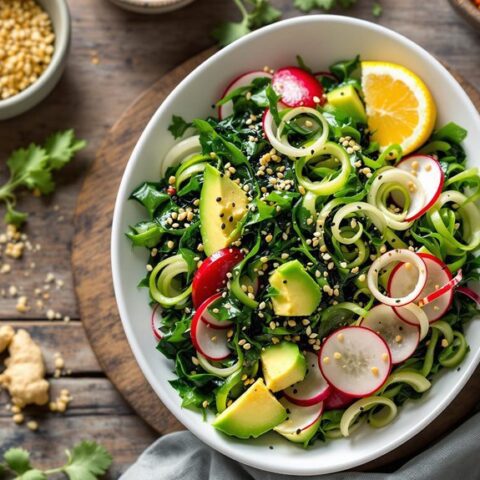
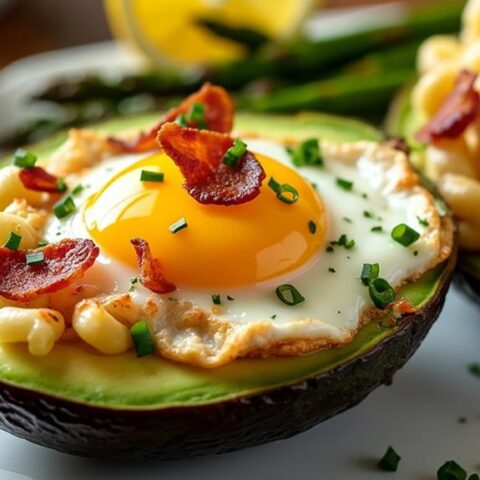
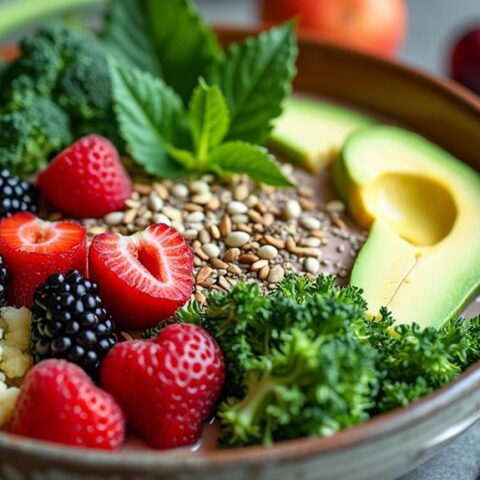
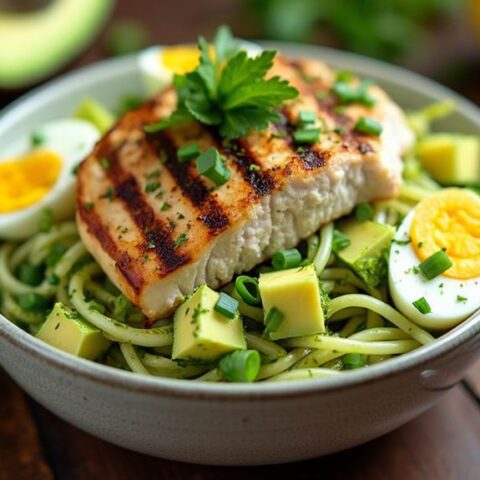
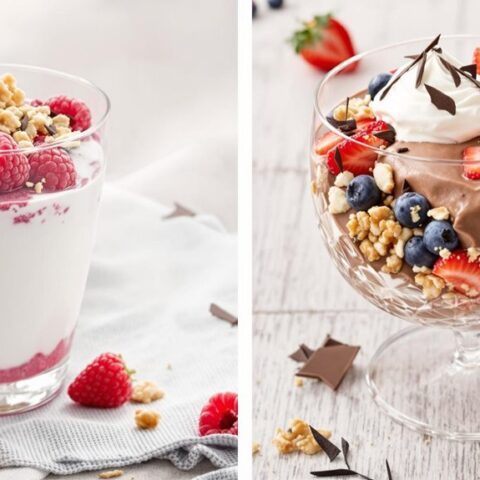




No Comments